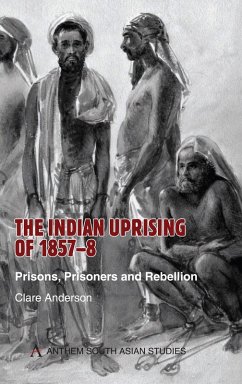
1857 Indian Uprising and the Politics of Commemoration (eBook, PDF)
Versandkostenfrei!
Sofort per Download lieferbar
54,95 €
inkl. MwSt.
Weitere Ausgaben:

PAYBACK Punkte
27 °P sammeln!
The Cawnpore Well, Lucknow Residency, and Delhi Ridge were sacred places within the British imagination of India. Sanctified by the colonial administration in commemoration of victory over the 'Sepoy Mutiny' of 1857, they were read as emblems of empire which embodied the central tenets of sacrifice, fortitude, and military prowess that underpinned Britain's imperial project. Since independence, however, these sites have been rededicated in honour of the 'First War of Independence' and are thus sacred to the memory of those who revolted against colonial rule, rather than those who saved it. The...
The Cawnpore Well, Lucknow Residency, and Delhi Ridge were sacred places within the British imagination of India. Sanctified by the colonial administration in commemoration of victory over the 'Sepoy Mutiny' of 1857, they were read as emblems of empire which embodied the central tenets of sacrifice, fortitude, and military prowess that underpinned Britain's imperial project. Since independence, however, these sites have been rededicated in honour of the 'First War of Independence' and are thus sacred to the memory of those who revolted against colonial rule, rather than those who saved it. The 1857 Indian Uprising and the Politics of Commemoration tells the story of these and other commemorative landscapes and uses them as prisms through which to view over 150 years of Indian history. Based on extensive archival research from India and Britain, Sebastian Raj Pender traces the ways in which commemoration responded to the demands of successive historical moments by shaping the events of 1857 from the perspective of the present. By telling the history of India through the transformation of mnemonic space, this study shows that remembering the past is always a political act.
Dieser Download kann aus rechtlichen Gründen nur mit Rechnungsadresse in A, B, BG, CY, CZ, D, DK, EW, E, FIN, F, GR, HR, H, IRL, I, LT, L, LR, M, NL, PL, P, R, S, SLO, SK ausgeliefert werden.













